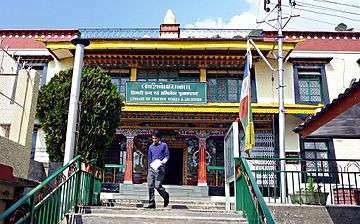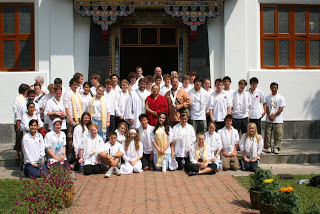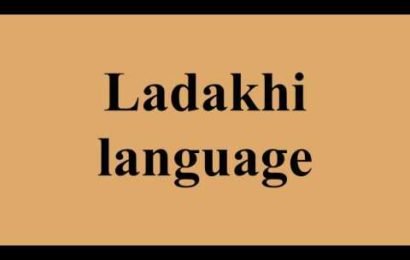Library of Tibetan Works Archives
The LTWA also offers daily Tibetan language classes taught by experienced teachers to help people better understand Tibetan culture. Tibetan language courses are taught in two semesters: March 15 to July 14, and August 1 to December 15. There are three regular Tibetan language classes: basic, intermediate and higher intermediate; and two regular speaking classes: basic and intermediate. There are two other classes: one basic casual Tibetan language class and one early morning advanced Tibetan language class. The classes are held five times a week from Monday to Friday.
Notes:
Serious students who wish to receive the LTWA certificate on completion of a semester must sit for monthly tests.
New students who wish to study basic Tibetan language will be admitted to the Casual Tibetan Language Course at any time during a semester. For other Tibetan language and speaking classes, new students will not be admitted after the third week of a semester.
REGULAR TIBETAN LANGUAGE COURSES
Basic Tibetan Language Course:
Beginning with the alphabet, vowels and combinations of letters, students learn the fundamental structure of the language, how to make simple sentences and so forth. The aim at this level is to train students in reading and simple conversation.Time : 9:00 AM – 10:00 AM
Teacher: Acharya Pema Khando
Subsitute : Dr. Chok and Acharya Ani Norzom
Textbooks:
- Tsetan Chonjore’s Colloquial Tibetan: A Textbook of the Lhasa Dialect (LTWA publication)
- Dr. Chok’s A Standard Tibetan Pronunciation (not yet published)
- Franziska Oertle’s The Heart of Tibetan Language (LTWA publication)
Intermediate Tibetan Language Course:
The intermediate course is a stepping-stone to the upper intermediate course. Students in this course reinforce and extend their command of Tibetan grammar and idioms. The main aim of this class is to help students become confident in Tibetan.
Time : 9:00 AM – 10:00 AM
Teacher: Paldon Tsomo
Subsitute : Thupten Gyaltsen and Dhadon
Textbooks:
- Lobsang Thonden’s Modern Tibetan Language, Vol. 1 (LTWA publication)
- His Holiness Dalai Lama’s biography Freedom in Exile (LTWA publication)
- Folklore: a Tibetan textbook (not yet published)
- Yangchen Drupe Dorjee’s Legs bshad ljon dbang
Higher Intermediate Tibetan Language Course:
In this course, Tibetan grammar and honorific words are taught. The class also touches on aspects of Tibetan culture and religion to provide students with a basis for discussing Buddhism in Tibetan.
Time : 2:00 PM – 3:00 PM
Teacher: Acharya Pema Khando
Subsitute : Paldon Tsomo and Phurbu Dolma
Textbooks:
- Geshe Thupten Sopa’s Lectures on Tibetan Religion and Culture(LTWA publication)
- His Holiness the Dalai Lama’s biography Freedom in Exile
- Thupten Chokdrup’s Bod kyi sgra rig pa’i gnas la dpyod pa bsal ba’i me long (LTWA publication)
- Ngeton Gyatso’s bsTon pa’i mdzad rnam gsal ba’i me long (LTWA publication)
REGULAR TIBETAN SPEAKING COURSES
Basic Tibetan Speaking Course:
This course is aimed at assisting our students to communicate in Tibetan, thereby enriching their knowledge of the feelings and basic way of life of Tibetans. The main aim of this class is to help students become more confident in spoken Tibetan.
Time : 10:30 AM – 11:30 AM
Teacher: Paldon Tsomo
Subsitute : Dr. Chok and Phurbu Dolma
Textbooks: Dr. Chok’s Speak Fluent Tibetan (LTWA publication)
Intermediate Tibetan Speaking Course:
Students will reinforce and extend their command of spoken Tibetan, thereby enriching their knowledge of the feelings and basic way of life of Tibetans. The main aim of this class is to help students become more confident in speaking Tibetan.
Time : 12:00 PM – 1:00 PM
Teacher: Paldon Tsomo
Subsitute : Acharya Pema Khando and Tsering Norbu
Textbooks: Nyima Deckyi’s Speak Tibetan the Tibetan Way (LTWA publication)
CASUAL TIBETAN LANGUAGE COURSE
Beginning with the alphabet, vowels and combinations of letters, students learn the fundamental structure of the language, how to make simple sentences and so forth. The aim at this level is to train students in reading and simple conversation. Students may enroll anytime of the academic year.
Time : 10:00 AM – 11:00 AM
Teacher: Acharya Ani Norzom
Substitute : Dr. Chok and Dhadon
Textbooks :
- Tashi’s A Basic Grammar of Modern Spoken Tibetan (LTWA publication)
- Dr. Chok’s A Standard Tibetan Pronunciation (not yet published)
INTENSIVE LEARNING PROGRAMS
The LTWA organizes two yearly intensive learning programs. A three-month Intensive Translation Program was started in 2006 and a two-month Intensive Tibetan Studies Program was started in 2011. This year, the Intensive Tibetan Studies Program is tentatively scheduled from April 2 to May 31, and the Intensive Translation Program is from July 2 to September 29. A minimum of fifteen students are required to run the program and a maximum of forty students are admitted to each program.
The programs are open to Tibetans and others from the Himalayan regions and foreigners who have a good command of the Tibetan language. In the Intensive Tibetan Studies Program, students are taught Tibetan language and literature, Buddhist philosophy and practice, and Tibetan history. In the Intensive Translation Program, students are taught Tibetan language and literature, Buddhist philosophy and practice, English language and literature, and translation methodology.
Read details: http://tibetanlibrary.org/tibetan-language-courses/
Tibetan Language Institute
The Tibetan Language Institute was founded on the belief that Tibetan language study is essential for the preservation of Tibetan culture, a vibrant world heritage whose message is peace. On a smaller but not less important scale, learning even a little Tibetan provides a deeply rewarding means for the individual Dharma practitioner to enrich Dharma practice. TLI strives to create opportunities wherein both goals can be realized.
TLI offers a bridge to the ancient wisdom traditions of Tibet as well as the contemporary Tibetans. Our Institute presents classes, seminars, workshops, and public lectures on Tibetan language, culture, literature, and philosophy (this includes on-going programs of study of Tibetan texts, conversational Tibetan, calligraphy, and lectures by guest speakers). The Institute strives to enhance the language learning possibilities of students of all backgrounds, from academicians and to ordinary people from all around the world.
All programs are organized by executive director David Curtis who studied at Kagyu Ling Monastic College in France (founded by H. E. Kalu Rinpoche), where he completed the traditional Three-Year Retreat. By expanding opportunities to study with Tibetans, we strive to foster the development of qualified translators and scholars while promoting greater contact within the community for mutual benefit through the valuable experience of cultural exchange.
The TLI Office: A Tradition of Service
The Tibetan Language Institute strives to assure that the work undertaken by the Institute has a positive effect on the community of those interested in Tibetan language, culture and Dharma.
The philosophy animating the Institute is oriented by Buddhist principles. TLI tries to be grounded in “open-hearted” styles of office and work policies based on knowledge gained from study of Tibetan Buddhist traditions themselves. The Institute provides volunteers and staff with learning opportunities to enhance their own knowledge of Tibetan language and culture, so that they, too, can contribute to the mission of the Institute. The result of this office orientation has been a steady stream of ever-more dedicated, talented, and increasingly well-trained individuals whose contributions have been meaningful.
Over the past decade, dozens of volunteers have contributed countless hours of time and services to further TLI’s mission. Their input and hard work has been and continues to be of invaluable help. The part-time office staff has clocked thousands of hours, believing in the project and sustaining TLI with a dedicated and joyful esprit de corps. If you are interested in volunteering opportunities (PDF), please contact us.
The Tibetan Language Institute is envisioned as a long-term, quality service for the world community. The director, board, staff and volunteers look forward to continued growth not only of TLI activities, but also of welcoming more and more individuals of like mind into the TLI family.
Instruction and Study Materials:
TLI offers several ways to learn Tibetan, great learning materials, and the opportunity to study with David Curtis, a teacher noted for his knowledge and kindness.
In general, because of its outstanding services and programs, most people have come to study at TLI for many reasons:
-
- Students want to learn more about the Buddhadharma in general, and realize that learning Tibetan will further their understanding and meditation practice.
- Students want to be conversant with their practice texts, no longer satisfied with merely reciting prayers in an unknown language.
- Students want to do a retreat and need to know the Tibetan of practice texts and commentaries to fully benefit from this experience.
- Students would like to converse with Tibetan Rinpoches, Lamas and friends who have limited fluency in English.
To contact TLI by email: info@tibetanlanguage.org
To contact TLI by telephone: 406/ 961-5131 or 406/ 961-0031
To contact TLI by mail: Tibetan Language Institute P.O. Box 2037, Hamilton, MT 59840
THE TIBETAN LANGUAGE INSTITUTE ANNOUNCES
BEGINNING TIBETAN: LEVEL 1
BY TELEPHONE CONFERENCE CALL
A NINE-WEEK COURSE ON TUESDAYS,
BEGINNING JANUARY 22, 2019
Curriculum for Level I Course
Students will learn the alphabet, how to read, and basic vocabulary.
Classes are fun and a great way to fuel your studies. This course is ideal for those students needing a review or for those who cannot attend a seminar in person.
How does the course work?
All you need to do
(1) Register for the class on the TLI website. Don’t wait as this teleconference technology has limits on how many can attend.
(2) Obtain the necessary Level I Manual and/or Beginner’s Package. Click here for information about these materials.
3) On the designated time and day, call the special number that will be given to you each week. This telephone number is not toll free.
4) Have to miss a class? Just want to listen to the class a second time? Not a problem because included in your registration is a phone number to access a telephone recording of the class (not a computer download). Students tell us over and over that this is a very useful and convenient aspect to the class.
Read details: http://www.tibetanlanguage.org





